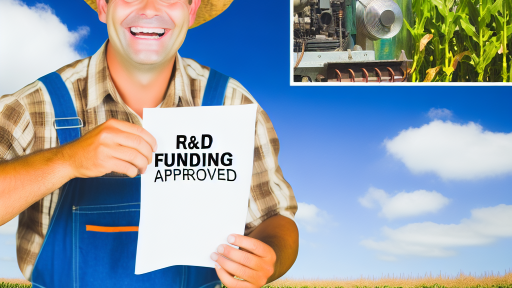Introduction to Organic Farming
Definition of Organic Farming
Organic farming is a method of agriculture that emphasizes natural processes.
It avoids synthetic fertilizers, pesticides, and genetically modified organisms.
This approach promotes biodiversity and soil health.
Additionally, it focuses on sustainable practices that protect the environment.
Importance of Organic Farming
Organic farming plays a crucial role in preserving ecosystems.
By reducing chemical usage, it minimizes pollution and health risks.
This practice also supports local economies and communities.
Furthermore, it offers consumers healthier food options.
Principles of Organic Farming
Organic farming operates on several key principles.
-
Maintaining soil fertility through natural methods.
-
Supporting biodiversity and natural pest control.
-
Promoting sustainable and eco-friendly practices.
Impact on Food Quality
Research shows that organic foods often have higher nutritional value.
They typically contain fewer pesticide residues compared to conventional crops.
Moreover, organic farming enhances flavor and freshness.
Challenges in Organic Farming
Despite its benefits, organic farming faces significant challenges.
-
Higher production costs can affect market prices.
-
There are stringent regulations for certification.
-
Pest management can be more difficult without synthetic inputs.
Future of Organic Farming
The future of organic farming looks promising yet requires adaptation.
New techniques and technologies can improve efficiency and yields.
Transform Your Agribusiness
Unlock your farm's potential with expert advice tailored to your needs. Get actionable steps that drive real results.
Get StartedCollaboration among farmers, researchers, and consumers is essential.
Overall, organic farming poses a viable alternative to conventional methods.
Overview of Organic Certification
Definition and Importance
Organic certification demonstrates a commitment to sustainable farming practices.
This certification assures consumers that products meet specific organic standards.
Furthermore, it encourages environmental stewardship among farmers.
Key Requirements for Certification
Farmers must follow strict guidelines to achieve organic certification.
First, they must avoid synthetic pesticides and fertilizers.
Second, they need to utilize organic seeds and livestock feed.
Additionally, they must implement crop rotation and soil management techniques.
The Certification Process
The organic certification process involves several steps.
Initially, farmers must select a certifying agent.
Next, they submit an application detailing their farming practices.
Afterward, the certifying agent conducts an on-site inspection.
If the farm meets all criteria, they issue an organic certificate.
Moreover, organic farms undergo annual inspections to maintain their certification.
Compliance and Record Keeping
Maintaining organic certification requires diligent record keeping.
Farmers must document their farming practices, inputs, and sales.
This documentation helps in verifying compliance during inspections.
Records should be clear, accessible, and updated regularly.
Challenges of Organic Certification
Despite its benefits, organic certification poses challenges.
First, it can be costly for small farmers to obtain and maintain.
Second, the lengthy application process may discourage potential applicants.
Lastly, there is ongoing competition with conventional agriculture practices.
Benefits of Organic Certification
Organic certification offers significant advantages for farmers.
Showcase Your Farming Business
Publish your professional farming services profile on our blog for a one-time fee of $200 and reach a dedicated audience of farmers and agribusiness owners.
Publish Your ProfileIt enhances market access and potentially increases profitability.
Additionally, certified organic products often command higher prices.
Finally, certification fosters consumer trust and brand loyalty.
Key Regulatory Bodies Governing Organic Farming Practices
Introduction to Regulatory Bodies
Organic farming regulations help maintain standards in agricultural practices.
These regulations ensure that crops are grown without synthetic pesticides or fertilizers.
Understanding these regulations is crucial for farmers and consumers alike.
United States Department of Agriculture (USDA)
The USDA plays a vital role in organic farming oversight in the United States.
It administers the National Organic Program (NOP) to certify organic farms.
USDA standards ensure that organic produce meets specific criteria.
Farmers must comply with these standards to label their products as organic.
European Commission
The European Commission establishes regulations for organic farming in Europe.
It ensures that organic products originate from sustainable farming practices.
This body sets EU-wide standards that member states must follow.
Consequently, consumers across Europe can trust organic labels.
International Federation of Organic Agriculture Movements (IFOAM)
IFOAM is a global organization that promotes organic farming practices worldwide.
It provides a platform for collaboration and knowledge sharing among organic farmers.
IFOAM also helps develop international standards for organic agriculture.
This organization encourages sustainability and biodiversity in farming systems.
State Regulatory Agencies
In addition to national regulations, each state may have its own organic certification processes.
State agencies work alongside the USDA to enforce organic regulations.
They provide resources and support for local organic farmers.
This decentralized approach allows for tailored standards that fit regional needs.
Non-Governmental Organizations (NGOs)
Several NGOs advocate for best practices in organic farming.
Organizations like the Organic Trade Association (OTA) influence policy development.
They promote transparency and integrity within the organic sector.
Additionally, they offer educational resources for farmers and consumers.
Challenges Faced by Regulatory Bodies
Regulatory bodies often face challenges in enforcing organic standards.
One major issue is the rise of fraudulent organic labeling.
Maintaining consumer trust is essential for the integrity of organic farming.
Moreover, adapting regulations to new agricultural technologies presents further complexity.
Find Out More: Rural Development Policies That Promote Sustainable Agriculture
Standards for Organic Crop Production
Soil Management
Maintaining healthy soil is crucial for organic farming.
Farmers must enhance soil fertility using organic inputs.
This includes compost, cover crops, and crop rotation.
These practices improve soil structure and nutrient content.
Furthermore, they promote biodiversity within the soil ecosystem.
Organic regulations prohibit synthetic fertilizers and pesticides.
Seed Selection
Choosing the right seeds is essential for organic farmers.
Organic seeds must be certified and free from genetic modification.
Farmers often select heirloom or open-pollinated varieties.
Showcase Your Farming Business
Publish your professional farming services profile on our blog for a one-time fee of $200 and reach a dedicated audience of farmers and agribusiness owners.
Publish Your ProfileThese seeds adapt well to local conditions and pests.
Additionally, sourcing seeds from reputable suppliers is critical.
Organic Inputs
Organic farming relies on natural inputs to grow crops.
These include organic fertilizers and pest control methods.
Farmers use plant-based fertilizers, animal manure, and minerals.
Biological pest control helps manage weeds and insects.
For instance, farmers may introduce beneficial insects to crops.
Compliance and Certification
Compliance with organic regulations is mandatory for farmers.
They must maintain detailed records of practices and inputs.
Certification involves a thorough inspection process.
Farmers must demonstrate adherence to organic standards.
Once certified, they can market their products as organic.
See Related Content: Impact Of Conservation Programs On Farm Productivity
Livestock Regulations in Organic Farming: Animal Welfare and Feed
Overview of Livestock Regulations
Organic farming emphasizes animal welfare in its regulations.
Farmers must adhere to strict guidelines to ensure humane treatment of animals.
These regulations cover housing, health care, and feeding practices.
Animal Welfare Standards
Organic regulations require that livestock have access to the outdoors.
This access supports natural behaviors and promotes health.
Additionally, animals must have adequate space for movement.
This requirement helps reduce stress among livestock.
Housing Requirements
Livestock housing must provide protection from harsh weather conditions.
Also, it must be designed to maintain cleanliness and hygiene.
Proper ventilation is essential to ensure a healthy living environment.
Health Care Practices
Farmers must implement preventative health care for their animals.
This includes regular veterinary visits and vaccinations.
Moreover, the use of antibiotics is strictly restricted in organic farming.
Nutritional Standards
Feeding practices for organic livestock must meet specific regulations.
Animals must receive organic feed that is free from synthetic additives.
Farmers are encouraged to provide a diet rich in nutrients to promote health.
Feed Ingredients
Organic feed must consist of organic grains, forages, and supplements.
Farmers should avoid using animal by-products in feed formulations.
Pasture Requirements
Livestock raised organically must be grazed on pasture.
This practice offers numerous benefits, including improved animal health.
Furthermore, pasture access fosters better soil and ecosystem health.
Delve into the Subject: Adapting Farm Operations To New Import Export Tariffs

The Role of Inspections and Audits in Organic Certification
Importance of Inspections
Inspections play a crucial role in organic certification.
They verify compliance with established organic standards.
Moreover, they promote trust among consumers and producers.
Components of an Inspection
During an inspection, the certifying agent assesses various farm practices.
This includes evaluating soil health and pest management methods.
Showcase Your Farming Business
Publish your professional farming services profile on our blog for a one-time fee of $200 and reach a dedicated audience of farmers and agribusiness owners.
Publish Your ProfileAdditionally, inspectors review records of inputs used on the farm.
The process also involves interviews with farm personnel.
All these steps ensure adherence to organic guidelines.
Timing of Inspections
Inspections typically occur annually for certified operations.
However, new applicants may undergo an initial assessment first.
Follow-up inspections may happen if compliance issues arise.
Role of Audits
Audits complement inspections in the certification process.
They provide a systematic examination of record-keeping methods.
Audits ensure that all reported data aligns with actual practices.
Preparing for an Inspection or Audit
Farmers should maintain accurate and up-to-date records.
Documentation should include input purchases, harvests, and sales.
Additionally, being familiar with the organic standards is essential.
This preparation not only streamlines the inspection process but also fosters transparency.
Consequences of Non-Compliance
Failure to comply with organic standards can have serious implications.
It may result in temporary suspension of organic certification.
Severe or persistent violations can lead to permanent certification loss.
Moreover, this impacts market access and consumer trust.
Benefits of Regular Inspections and Audits
Regular inspections and audits enhance overall farm management.
They identify potential issues early, allowing for timely corrections.
This proactive approach supports sustainable farming practices.
Ultimately, it elevates the quality of organic products offered to consumers.
Gain More Insights: Key Steps To Achieve Pesticide Compliance
Labeling Requirements for Organic Products
Understanding Certification Labels
Certification labels communicate vital information about organic products.
They assure consumers that the product meets necessary organic standards.
Additionally, these labels indicate compliance with established regulations.
Organizations such as the USDA oversee the certification process.
Common Organic Labels
Several labels appear on organic products in the marketplace.
The “100% Organic” label signifies that the product consists entirely of organic ingredients.
“Organic” indicates that at least 95% of the ingredients are organic.
Furthermore, products labeled “Made with Organic Ingredients” contain at least 70% organic content.
Each label confers different levels of organic integrity to consumers.
Labeling Guidelines
Strict guidelines govern the use of organic labels.
Producers must adhere to standards set by the National Organic Program (NOP).
Violating these guidelines can result in penalties or loss of certification.
Packaging must clearly display the appropriate label.
Consumer Awareness and Education
Understanding labels empowers consumers to make informed choices.
Education initiatives help shed light on what these labels mean.
With this knowledge, consumers can support true organic farming practices.
Additionally, awareness campaigns can combat misleading labeling.
The Role of Transparency
Transparency is vital in organic labeling.
Showcase Your Farming Business
Publish your professional farming services profile on our blog for a one-time fee of $200 and reach a dedicated audience of farmers and agribusiness owners.
Publish Your ProfileProducers must provide information on sourcing and production methods.
Consumers increasingly demand clarity regarding their food choices.
This push fosters a culture of accountability in the organic market.
Challenges and Compliance Issues in Organic Farming Regulations
Navigating Complex Regulations
Organic farmers face numerous regulations that can be overwhelming.
Understanding these regulations is crucial for compliance.
Additionally, the rules vary by region and country.
Farmers must stay informed about changes in organic certification processes.
They should regularly consult the USDA or equivalent authorities for updates.
Costs of Compliance
Compliance with organic regulations often entails significant costs.
Farmers may need to invest in certified organic inputs and practices.
These costs can be particularly burdensome for small-scale operations.
Additionally, certification fees can be substantial.
Farmers must also allocate resources for ongoing record-keeping.
Challenges in Pest and Weed Management
Organic farming requires unique approaches to pest control and weed management.
Farmers cannot use synthetic pesticides or herbicides in organic systems.
This limitation poses challenges for effective pest and weed management.
Consequently, farmers must seek alternative methods such as crop rotation.
They may also utilize beneficial insects for pest control.
Maintaining Soil Health
Soil health is vital for organic farming success.
Farmers must implement practices that enhance soil fertility naturally.
This includes using cover crops and composting materials.
However, these practices require time and additional knowledge.
Farmers often face hurdles in transitioning to fully organic systems.
Market Access and Consumer Awareness
Accessing organic markets can be challenging for farmers.
They need to connect with buyers who appreciate organic products.
Consumer awareness of organic farming benefits plays a significant role.
Farmers must invest in marketing strategies to educate consumers.
Building trust with customers can enhance market access.
Strategies for Overcoming Challenges
Farmers can adopt various strategies to navigate these challenges.
Joining organic farming associations can provide valuable resources.
Collaborative efforts with other farmers can enhance knowledge sharing.
They can also access training programs focused on organic practices.
Networking within the community fosters support and motivation.
Additional Resources
Improving the understanding of farmers’ non-compliance with …




